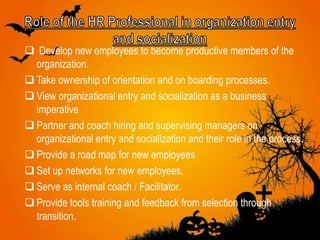Employee socialization
- 1. Presented By Ramkrishna Rajput Paper-II SHRM-I SHRM Roll No.15 Exam Sheet No.116046
- 2. Socialization is process by which a person learn the values, norms and required behaviours which permit that individual to participate as a member of organisation. Socialization is characterized as a process by which new organizations members learn and adapt to norms expectations and perspectives or their organization and its members.
- 3. Employee Socialization :- When new employees enter an organization they feel out of place because of the new surroundings, new boss and new co-worker. Hence it is the responsibility of the management to orient the employees and to make the process of socialization smooth. This will ensure that the new employees adapt to the organizational culture as soon as possible. The process of adaptation is commonly termed induction or socialization. The socialization process is not confined to employees entering new organization. It is also important for employees moving within the organization as result of lateral transfers and promotions. Orientation is only a small part or the overall socialization program. The process of orientation includes introduction of the new employee to the organization and to his work unit and supplementing the information given to him during recruitment and selection.
- 4. An organization orientation program should make a new employee familiar the organization’s history, philosophy, objectives ,procedures and rules. To understand the concept of socialization, a look at organization culture and its understand the role he has to play in that particular job, the values of the organization that he has to uphold and the norms set by his peer group that he has to uphold and the norms set by his group that he has to conform to. The socialization process is based on some general assumptions. The process of socialization affects the new employees work productivity, commitment to the organizations objectives and his decision to stay with the organization. They are various alternatives that a manager can consider when designing effective socialization strategies. The are formal or informal individual or collective sequential or non-sequential, fixed or variable, Tournament or contest, serial or disjunctive, investiture or divestiture socialization strategies.
- 5. Increase productivity / performance Research has shown that workplace chatter,even a small talk actually increase productivity. Employee moods emotion and overall disposition have a strong impact on job performance decision making turnover teamwork and leadership. Maintains healthy living When employees feel comfortable with their peer and supported by management the risk of sickness, disease, and the need to take a metal health day decreases dramatically. Encourages team work Encouraging your employees to develop relationships within the company not only goes a long way in creating a social fun atmosphere but also increases employee loyalty. Acclimates new employees faster Co-worker support and encouraging socialization may assist in helping him or her find a good fit within the company culture as well as find the right mentor to get up to speed in the new role faster.
- 6. Develop new employees to become productive members of the organization. Take ownership of orientation and on boarding processes. View organizational entry and socialization as a business imperative Partner and coach hiring and supervising managers on organizational entry and socialization and their role in the process. Provide a road map for new employees Set up networks for new employees. Serve as internal coach / Facilitator. Provide tools training and feedback from selection through transition.






